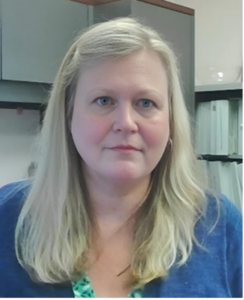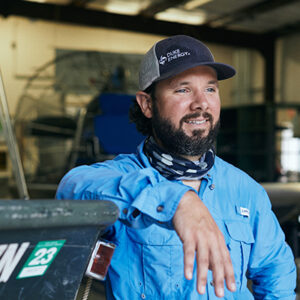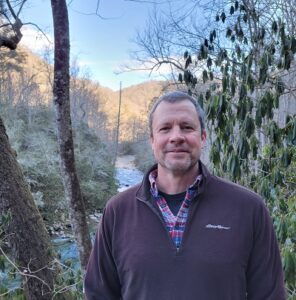Advisory Committee
An advisory committee, representing state and federal agencies, industry, local government, and non-governmental stakeholder groups, helps WRRI identify priority issues to address through our research and outreach activities.
Meet the Committee
Jill Deaney

Assistant Director of Environmental and Sustainability department at Cape Fear Public Utility Authority
Jill Deaney joined the WRRI Advisory Board in 2024. Her role as an advisor for the WRRI is to provide expertise on areas such as:
- Water and wastewater regulations and regulatory compliance,
- Water and wastewater testing methods,
- Sampling, water quality monitoring and assessment,
- Emerging contaminants,
- Surface, groundwater and wastewater chemistry,
- Water quality standards
She is also a representative of the Urban Water Consortium, a group organized and administered by the WRRI. The consortium comprises 12 of North Carolina’s largest water/wastewater utilities, and was established to provide research and development, and technology transfer on water resources issues shared by urban areas and water utilities in the state.
She is currently the Assistant Director of Environmental and Sustainability department at Cape Fear Public Utility Authority overseeing all activities of the Laboratory Division. She serves on the Lower Cape Fear River program as the Quality Assurance/Quality Control (QA/QC) chair.
Previously, she worked for environmental contract laboratories in North Carolina and Pennsylvania. Prior to moving into the environmental sector, She held several leadership roles in the textile industry including laboratory supervisor and quality control supervisor.
Deaney received her Bachelor of Science degree in Textile Chemistry from Clemson University in 1994.
Allie Dinwiddie

Non-point Source Planning Coordinator, NC Department of Agriculture and Consumer Services
Allie Dinwiddie joined the WRRI Advisory Board in 2021. Her role as an advisor for the WRRI is to provide expertise on areas such as non-point source impacts and management, agricultural best management practices including nutrient and waste management, agriculture rule implementation in NC nutrient sensitive watersheds, geographic information systems (GIS), eutrophication, environmental change and resiliency. She is currently the Non-point Source Planning Coordinator at North Carolina’s Department of Agriculture and Consumer Services (NCDA&CS) in the Division of Soil and Water Conservation (DSWC). The NCDA&CS – DSWC works with the WRRI to cross-pollinate ideas to maximize natural resource management successes and improve water quality in NC.
Previously, Dinwiddie was a Central Regional Coordinator for the NCDA&CS-DSWC where she carried out policies and procedures put forth by the NC Soil and Water Conservation Commission, NCDA&CS, and DSWC, and, amongst other duties, provided direct support to fifteen local Soil and Water Conservation Districts. Before that, she was a Water Quality Planner for the Addison County Regional Planning Commission through the Vermont Department of Environmental Conservation’s ECO AmeriCorps program.
Dinwiddie received her bachelor’s in environmental engineering from North Carolina State University in 2018.
Karen Higgins

Water Planning Section Chief, NC DEQ Division of Water Resources
Karen Higgins joined the WRRI Advisory Board in 2020. Her role as an advisor for the WRRI is to provide her expertise on anything dealing with ground or surface water quantity and quality; chemical, physical and biological water quality in natural systems; fate and transport of nutrients; eutrophication; toxicity assessments; water quality & quantity monitoring; water quality standards; wastewater management; stormwater management; wetlands functions; aquifer hydrogeology; wastewater reuse management; concentrated animal wastewater management; physical, chemical and biological laboratory analytical methods); in-stream flow, drought management, water conservation and basin modeling. She is the Water Planning Section Chief at NC DEQ’s Division of Water Resources, which partners with WRRI on water resources related projects and research. The Water Planning Section develops standards, basin plans, models, rules and management strategies for the protection of water quality, prepares the biennial Integrated Report and 303(d) list, provides guidance to local water systems and administers the Drought Management Advisory Council.
Before her current position at the NC DEQ, Higgins managed the 401 Water Quality Certification and Riparian Buffer Program within NC DEQ. Prior to working at NC DEQ, Higgins worked as a biologist with the U.S. Forest Service in Oxford, Mississippi and with the U.S. Geological Survey in Menlo Park, California.
Higgins received a Master of Science degree in Zoology from Miami University and a Bachelor of Science in Environmental Science from the University of Kansas. Rock chalk Jayhawk!
Jason Hunt, P.E.

Watershed Planner, Charlotte-Mecklenburg Storm Water Services; Stormwater Consortium
Jason Hunt joined the WRRI Advisory Board in 2015. His role as an advisor for the WRRI is to provide expertise on surface water quality, stormwater control measures, stormwater best management practices, watershed planning, water quality monitoring, PAHs, stream toxicity and green infrastructure. As the Watershed Planner for Charlotte-Mecklenburg Storm Water Services, he helps develop watershed management plans that identify stream or lake impairments and improvement strategies. He also represents the Stormwater Consortium, which is organized and developed by the WRRI. The group sponsors research and technology transfer on urban stormwater and management issues.
Prior to his work with the City of Charlotte, Hunt worked for the Philadelphia Water Department’s Planning & Research Division and the Surface Water Protection Program of the Office of Watersheds. In these capacities, he developed Source Water Protection Plans, oversaw a real-time surface water quality early warning system for Philadelphia’s drinking water sources, participated in emerging contaminant monitoring and research, oversaw wastewater treatment optimization efforts to reduce combined sewer overflows (CSOs), and worked on efforts to convert methane from the wastewater treatment process to electricity.
Hunt has a B.S. in Civil Engineering from Drexel University and an M.S. in Water Resources and Environmental Engineering from Villanova University.
Gina Kimble, Ph.D.

Laboratory Manager, Charlotte Water; Urban Water Consortium
Gina Kimble has been a WRRI advisory board member since 2017. Her role as an advisor for the WRRI is to provide her expertise on water quality; water treatment; drinking water regulations; laboratory/analytical methods for chemistry and microbiology; Cryptosporidium and Giardia; disinfection by-products; and emerging contaminants. She is currently a Laboratory Manager at Charlotte Water under the City of Charlotte. Under this role she directs the operation of Charlotte Water’s Laboratory Services Division. She is also a representative of the Urban Water Consortium, a group organized and administered by the WRRI. The consortium comprises 12 of North Carolina’s largest water/wastewater utilities, and was established to provide research and development, and technology transfer on water resources issues shared by urban areas and water utilities in the state.
Before her role as Laboratory Manager at Charlotte Water, she was a Laboratory Supervisor and a Laboratory Analyst there. Under those roles she was a Method 1623 Principal Analyst for Cryptosporidium and Giardia and conducted other microbiological analyses, performed analysis of disinfection by-products, and completed research and method development projects.
Kimble holds a Ph.D. in infrastructure and environmental systems and a master’s of science from the University of North Carolina at Charlotte. She received her bachelor’s in forensic science from Eastern Kentucky University.
Bill Kreutzberger, MSPH

Retired, formerly of CH2M Hill Global Business Group
Bill Kreutzberger has been a WRRI advisory board member since 1998. His role as an advisor for the WRRI is to provide the board with his expertise on water quality regulatory programs, water quality assessments, non-point source impacts and management and water quality modeling, especially nutrients. He is retired and was previously Vice President and Fellow water resources and water quality specialist for CH2M.
Kreuztberger received a master’s in public health from University of North Carolina at Chapel Hill’s environmental sciences and engineering department. He earned his bachelor’s in environmental science and biology from the University of Wisconsin-Green Bay.
Brett Hartis, Ph.D

Lead Scientist, Duke Energy Water/ Natural Resources
Brett Hartis is a lead scientist for Duke Energy Corporation’s Water Resources Team, located in Charlotte, NC. His current responsibilities include addressing threats posed by invasive species to Duke Energy project reservoirs and generation assets, developing collaborative management plans, and implementing effective management strategies.
Brett earned his BS in Fisheries Science at East Carolina University and his MS and PhD in Fisheries, Wildlife, and Conservation Biology from North Carolina State University (NCSU). After completing his PhD, Brett worked as an extension and research associate with NCSU’s Department of Crop Science, focusing on aquatic plant management issues in reservoirs across the southeastern US. Following work with NCSU, Brett joined the Tennessee Valley Authority (TVA) as manager of the multi-state public utilities’ aquatic plant management program.
Brett has expertise in aquatic resources monitoring, management, and policy, and the experience to provide realistic and adaptive solutions to large scale invasive species management programs. His professional goals include the development and implementation of advanced techniques for assessment and management of natural resources, especially in aquatic communities. More specifically, broadening the understanding of interconnectedness within aquatic and terrestrial communities, assessing the direct and indirect impacts of invasive species, and providing education and outreach to various groups regarding these issues.
Brett currently serves as President of the Aquatic Plant Management Society and past president of the Midsouth Aquatic Plant Management Society. Brett is a native of Marion, NC and spends most of his free time in the outdoors with his wife and two sons.
Caroline Loop, Ph.D.

Deputy Director of Environmental Services, Wake County
Caroline Loop is the Deputy Director of the Wake County Environmental Services Department. In this role, she leads initiatives impacting water quality, solid waste, and animal services. She has served as an advisory committee member for the North Carolina Water Resources Research Institute since 2018. Previously, Dr. Loop worked as an environmental consultant focusing on remediation at contaminated sites including providing scientific expertise for litigation. Dr. Loop is a licensed geologist and received her Ph.D. in geosciences from The Pennsylvania State University. She earned her bachelors in geology and economics from Smith College.
Kim Matthews

Senior Manager, Environmental Sciences & Engineering, RTI International
Kimberly Matthews is an environmental scientist focused on watershed management with expertise in wetland ecology, water quality, and stormwater management. She has experience working with multidisciplinary teams of researchers, modelers, and data management teams in coastal, estuarine, freshwater, and wetland investigations.
Ms. Matthews has led integrated watershed assessments to determine watershed health and assess future vulnerabilities to guide management decisions. She has conducted feasibility assessments for stream and wetlands mitigation and alternative analyses for transportation projects with a focus on wetlands, streams, water quality, aquatic wildlife, terrestrial wildlife, invasive/exotics species, and protected species.
Her expertise in environmental science lends itself to projects coordinated with state and federal agencies to ensure that projects comply with applicable environmental permits and regulations. Ms. Matthews has participated in public hearings and interagency meetings and managed projects with both field and technical components to provide a comprehensive assessment. She enjoys working with various stakeholders to translate scientific findings though presentations, webinars, websites, factsheets, and social media.
Wayne Miles

Stormwater Program Manager, City of Raleigh Engineering Services Department; Stormwater Consortium
Wayne Miles joined the WRRI Advisory Board in 2021. His role as an advisor for the WRRI is to provide expertise on a variety of urban wet weather and water quality issues. He also represents the Stormwater Consortium on the board. The Stormwater Consortium is organized and developed by the WRRI. The group sponsors research and technology transfer on urban stormwater and management issues. Wayne currently serves as the Stormwater Program Manager for the City of Raleigh’s Engineering Services Department. In this role he oversees all aspects of the city’s stormwater program, including budget and financial management; regulatory compliance; development reviews and inspections; floodplain management; water quality improvements; and capital improvements planning, design, and construction.
Before his current position under the City of Raleigh, Wayne was Senior Vice President at CDM Smith. During his 30 years there, he served in a wide variety of roles including program manager, technical/quality director, regional technical services manager, strategic initiative leader, and project manager. He also served as a national expert on utilities management, asset management, and sanitary sewer overflow compliance programs.
Miles holds both a master’s and bachelor’s degree in environmental engineering from the University of Florida.
Eric Romaniszyn

Senior Scientist, EnviroScience, Inc.
Eric Romaniszyn has been an WRRI advisory board member since 2013. His advisory role for the WRRI board is to provide his expertise on benthic macroinvertebrate communities, fish communities, stormwater, erosion and sedimentation, riparian buffers, bacteria, nutrification, water chemistry, land use planning, headwaters, and steep slope development. He is currently Senior Scientist with EnviroScience, Inc. where he coordinates environmental assessments, environmental impact statements, biological assessments, ecological risk assessments, and ecological inventories. Prior to this position, he spent 18 years as Executive Director for the nonprofit Haywood Waterways Association, where he was responsible for organizational management and implementing strategies of the Pigeon River Watershed Action Plan to reduce impacts from nonpoint source pollutants.
Romaniszyn received a Master of Science in Entomology from the University of Georgia; and a Bachelor of Science in Biology from Kent State University.
Allison Stenger

Environmental Scientist and Department Manager, Terracon Consultants Inc.
Allison Stenger is new to the WRRI Advisory Board, joining in 2025. She is an Environmental Scientist with Terracon, with environmental consulting experience managing complex groundwater investigatory and remediation projects under numerous regulatory agencies and regulations. Her responsibilities at Terracon include being the Raleigh Environmental Department Site Investigation and Remediation Practice Lead, traditional project management, project planning and implementing, serving on Terracon’s national PFAS team, and both completing and training others on technical report writing. Allison has a heavy focus on data interpretations, quality, and usability and strongly believes that our science is only as good as our ability to communicate it.
Allison received a Bachelor of Science in Environmental Technology and Management from NC State University.
Charlie Stillwell, Ph.D.

Hydrologist, South Atlantic Water Science Center’s Watershed and Statistical Hydrology Team
Dr. Charles Stillwell is a Hydrologist for the U.S. Geological Survey’s South Atlantic Water Science Center in Raleigh, NC. He studies hydrology in altered watersheds, particularly those impacted by urbanization. How does land development affect flow, water quality, and geomorphology? Can green infrastructure counteract hydrologic alteration? Dr. Stillwell use statistical, data-driven methods to understand these patterns. His research supports water resource decision makers. Dr. Stillwell earned his B.S. in Civil Engineering at Drexel University followed by M.Eng. and Ph.D. in Biological and Agricultural Engineering at North Carolina State University.
Toby Vinson
Division of Energy, Mineral & Land Resources Director, NC DEQ
Steve Wall

Policy Research Associate, UNC Institute for the Environment
Steve Wall has over twenty-five years of experience working on legal and environmental policy issues at the state and federal levels. Since 2014 Steve has worked as a Policy Research Associate with the UNC Institute for the Environment. His work at the Institute focuses on engaging with policy-makers, the media, and the public through the communication of environmental research and identifying policy solutions.
In 2016 Steve’s role with UNC expanded as he joined the staff of the NC Collaboratory, which was established by the legislature to utilize the research expertise of the UNC System for the benefit of the state. He currently serves as the Collaboratory’s Senior Research Advisor focusing on research initiatives related to water quality, flood resiliency, and the next generation energy sector.
Steve’s prior work experience includes several years as a policy advisor in the Secretary’s Office of the North Carolina Department of Environment and Natural Resources (DENR) where he was involved in developing and implementing policy initiatives in a variety of areas, including water and air quality projects, land conservation, and renewable energy. He began his policy career in Washington, D.C. as a congressional aide working on environmental and agricultural policy.
Steve received his J.D. with honors from UNC-Chapel Hill School of Law and his B.A. with honors and distinction in Political Science from UNC-Chapel Hill.